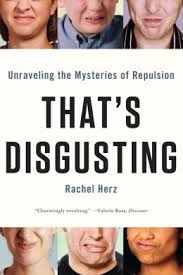Author(s): Rachel Herz
ISBN: 978-0393344165
APA Style Citation
Herz, R. (2013). That's disgusting: unraveling the mysteries of repulsion. New York: W.W. Norton & Co..
| start_your_class_with_this_tomorrow_thatsdisgust.pdf |
For instructors of Psychology, this is a great addition to the Sensation/Perception unit as well as a wonderful example of cross-cultural research regarding differences in disgust based on culturally learned experiences (Canada is considering placing a $850 fine on nose-pickers). This book is also quite applicable for the Motivation/Emotion unit as it relates to hunger motivation and of course the emotion of disgust. The book opens with a discussion about different food preferences in different cultures. Herz cites cookbooks, which many Americans might find too vile too eat such as A Bug Cookbook, Creepy Crawly Cuisine and the Gourmet to Edible Insects to name a few. This chapter also addresses competitive eating and how those participating keep from getting ill (by training and gradually increasing the amount their stomachs can hold). Herz describes an American exchange student in South America who is invited to participate in the honor of drinking ‘chicha’ in which her hosts chew corn flour and spit it into a milk jug that is buried until fermented and then passed around for each person to ‘enjoy’. Herz discusses the vast cultural variations related to taste preferences and those food items that we may deem “disgusting”. Herz describes how supertasters might be more inclined to disgust than non-tasters because they are more sensitive to the ingredients they taste. Herz addresses the unexpectedly clean things that most people find disgusting (toilet seats and public restrooms) and those that are the dirtiest (cell phones and computers). She recommends considering eating lunch in the public restroom rather than at your desk near all of the bacteria laden electronic devices we touch each day. Herz addresses how those with Huntington’s disease may not be able to detect disgust in others. In addition, those with OCD are not very good at detecting disgust in others because their experiences of what they find disgusting are often quite different from what others find disgusting therefore others are not a good reference point for what THEY will find disgusting. Psychopaths score low on the ability to empathize with others but may be able to sense people’s disgust because they have seen this emotion extended towards them more often than others. She goes on to discuss diseases we find disgusting and why disgust might provide an evolutionary advantage in these circumstances (keeping us disease free). This book might not be to best recommendation for high school students as she spends some time discussing disgust in sexual behavior. She also describes crimes that we find disgusting such as cannibalism and how the disgust factor may impact the severity of sentencing of criminals.
Other Related Resources
Disgust test
BBC Science: http://www.bbc.co.uk/science/humanbody/mind/surveys/disgust/
Psychology Today article: http://www.psychologytoday.com/blog/dont-look-dont-touch/201401/disgust-has-us-in-its-grip
Psychological Figures and Concepts
Charles Darwin: The Expression of the Emotions in Man and AnimalsPaul Ekman
Wallace Friesen
Paul Rozin
Anterior insula
Empathy
Perceptual sets
Self-fulfilling prophecy
Supertasters/non-tasters
Systematic desensitization

 RSS Feed
RSS Feed